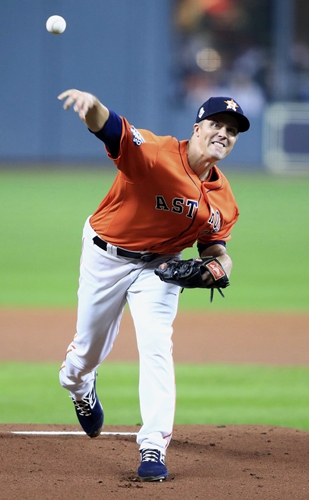MLB may kick off in early July
Source:AFP Published: 2020/5/14 11:08:42
Owners approve 2020 season proposal for players: reports

Zack Greinke of the Houston Astros pitches against the Washington Nationals in Game 7 of the World Series in Houston, Texas, on October 30. Photo: VCG
Major League Baseball team owners have approved a proposal for starting the coronavirus-delayed 2020 season in early July in ballparks without spectators, according to multiple reports Monday.
The campaign was shut down two months ago while preseason games were underway and the proposal for an 82-game season, about half the normal length, must still be approved by the players union.
Negotiatons were expected to begin later this week, according to ESPN, USA Today, The Athletic and NBC Sports.
The MLB plan becomes the first formal proposal for a major US sports league to exit a coronavirus hiatus, with the NBA, Major League Soccer and the National Hockey League seasons having been halted by the deadly outbreak.
The proposal would have players report to training camps starting in mid-June for about three weeks, either at home ballparks or training sites in Florida and Arizona, where stay-at-home rules have been eased.
The season would launch between July 1-4 and playoffs would expand from 10 to 14 teams, with two extra wild-card clubs in both the National and American Leagues. The playoffs would end in early November, only slightly later than normal.
Teams would mostly play against clubs from their own division, minimizing travel and expenses. They would also face clubs from the same division in the opposite league.
Designated hitters would come to bat instead of pitchers for National League teams for the first time in history. AL clubs have had the rule in place for decades.
Teams would play at their own home ballparks where allowed by state and local governments. Teams whose home stadiums are unavailable would play out of their spring training faciltiies.
Due to border crossing issues with Canada, the Toronto Blue Jays might have to play out of their Florida training headquarters.
Playing without ticket buyers would be expected to trim 40 percent off MLB revenues and the owners reportedly would seek a 50-50 revenue-sharing deal similar to what the NFL and NBA have used.
That might cause an issue with players, who are looking at losing half a season of their regular salary already in a shrunken campaign and could worry about owners pushing for a salary cap in the next collective bargaining agreement when the current one expires in December 2021.
MLB team owners have never offered to share extra profits with players so the union might very well object to having to share losses with the team owners this time.
Teams would expand rosters from 26 to 30 players with a support squad of 20 players available as replacements in case of injury or illness, including presumably positive coronavirus tests.
Health risk issues huge
Health issues would also have to be solved to the players' satsifaction, as tweets from Washington Nationals pitcher Sean Doolittle noted health issues that got little mention in early details on the MLB proposal.
"Bear with me, but it feels like we've zoomed past the most important aspect of any MLB restart plan: health protections for players, families, staff, stadium workers and the workforce it would require to resume a season," Doolittle tweeted.
Doolittle, who helped the Nationals beat Houston in last year's World Series, wondered how many COVID-19 tests would be neeeded for the league during the pandemic.
"Baseball requires a massive workforce besides the players: coaches, clubhouse staff, security, grounds crews, umpires, gameday stadium staff, TV & media... we need to protect everyone," he tweeted. "And that's before we get to hotel workers and transportation workers... They are essential workers. We wouldn't be able to play a season without them, and they deserve the same protections."
He also asked how much risk players are willing to assume to even play a season knowing that anyone involved with a game could be among the 20 percent of cases with severe symptoms - and if aded health-care benefits would be available for people with long-term health issues after catching the virus.
"We don't have a vaccine yet, and we don't really have any effective anti-viral treatments," Doolittle asked. "What happens if there is a second wave?"
Posted in: MISCELLANY